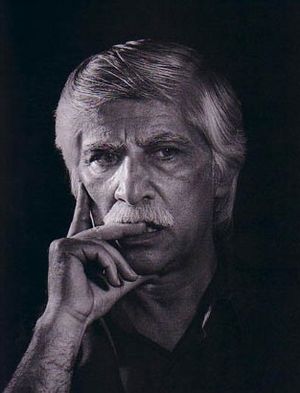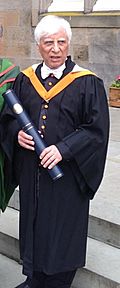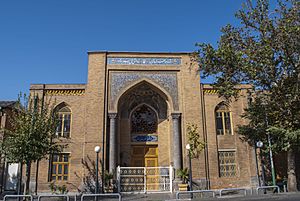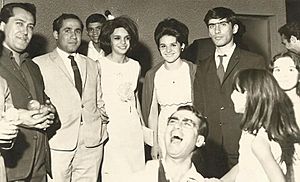Bahram Beyzai facts for kids
Quick facts for kids
Bahram Beyzai
|
|
|---|---|
| بهرام بیضائی | |

Beyzaie in 2002
|
|
| Born | 26 December 1938 Tehran, Imperial State of Iran
|
| Died | 26 December 2025 (aged 87) |
| Occupation | Playwright, director, screenwriter, editor, producer, theatre director, higher education teacher, historian, children's writer, impresario, dramaturge |
| Years active | 1962–2025 |
| Spouse(s) |
Monir-A'zam Raminfar
(m. 1965; div. 1991)Mojdeh Shamsaie
(m. 1992) |
| Children | 4, including Niloofar |
| Signature | |
 |
|
Bahrām Beyzāêi (born December 26, 1938, and passed away on December 26, 2025) was a very important Iranian artist. He was famous for his films, plays, and scholarly writings. He worked as a film director, playwright, theatre director, and screenwriter. He was also a respected "master" (called ostād) of Persian literature, mythology, and Iranian studies.
Beyzaie came from a family of poets. His father, Ne'matallah Beyzai, was a poet, and his uncle, Adib Beyzai, was a celebrated poet of the 20th century. Even his grandfather and great-grandfather were notable poets.
Even though he started making movies a bit later, Beyzaie is seen as a leader of a new style of filmmaking called the Iranian New Wave. His film Bashu, the Little Stranger (1986) was even voted "Best Iranian Film of all time" by many Iranian critics. Before his film career began in 1970, he was already a top playwright and theatre historian. Many people consider him the greatest playwright in the Persian language, often calling him "The Shakespeare of Persia."
From 2010 until his passing, Beyzaie lived and taught at Stanford University in the United States.
Contents
The Life and Work of Bahram Beyzai
Early Life and Discovering His Passion
Beyzaie was born in Tehran, Iran. His father was a poet and writer, and his mother was a homemaker. His father had a legal job, which allowed him to pursue his love for literature.
Around age 17, Beyzaie started skipping school. He loved going to movies, which were becoming very popular in Iran. This made him want to learn even more about cinema and art.
Young Bahram wasn't very interested in poetry, even though his family was full of poets. In high school, at Dar'ol-Fonoun, he wrote two historical plays. This became his favorite way to write stories.
At 21, he did a lot of research on traditional Persian plays, especially a type called Ta'zieh. By 1961, he had spent much time studying ancient Persian and pre-Islamic culture and literature. This led him to study Eastern theatre and traditional Iranian arts. His goal was to create a new, unique identity for Iranian theatre, different from Western styles. He also learned about Persian painting.
Becoming a Master Playwright
In 1968, Beyzaie helped start the Iranian Writers' Guild. This was an important group for writers, especially because of censorship (when governments control what can be published). In 1969, he was invited to teach at the University of Tehran's Theater Department. He led this department from 1972 to 1979. Under his leadership, many famous writers and artists taught there, making it a very successful time for the department.
Beyzaie's important book, A Study on Iranian Theatre (Namayesh dar Iran), was published in the mid-1960s. It is still considered the most important book about the history of Iranian theatre. Beyzaie was also the first scholar in Iran to publish books about theatre of Japan and theatre of China.
Some of his plays, like his famous Death of Yazdgerd, have been translated into many languages. They have been performed all over the world, including Iran, France, England, India, and the USA. Beyzaie also made a film of the same name in 1981.
Entering the World of Film in the 1970s
In 1969, Beyzaie started his film career. He directed a short film called Amu Sibilou (Uncle Moustache), followed by "Safar" in 1970. With these films, Beyzaie became a pioneer of the Iranian New Wave. This was a new movement in Persian cinema that began in the late 1960s.
Soon after, in 1971, he made his first full-length film, Ragbar (Downpour). Critics still see this as one of the most successful Iranian films ever made. The film starred the late Parviz Fannizadeh as its main character.
He produced and directed eight films. These include Qaribe va Meh (Stranger and the Fog) (1974), Cherike-ye Tara (Ballad of Tara) (1979), Bashu, the Little Stranger (1986, released in 1989), Shāyad Vaghti digar (Maybe Another Time) (1988), and Mosaferan (Travellers) (1992).
Continuing to Create Films in the 1980s
In 1981, there were big changes in Iran, and Beyzaie, like many others, was no longer allowed to teach at the university. However, he kept writing and making films. His screenplay Ruz-e Vaqe'e (The Fateful Day) was made into a film in 1995. Another screenplay became the film Fasl-e Panjom (The fifth season) in 1996. During this time, he also made four of his best films. He also helped edit another film called Borj-e Minu (Minoo Tower).
Later Years and Teaching at Stanford
Beyzaie married actress and make-up artist Mozhdeh Shamsai in 1992. After his film Mosaferan, he had trouble getting permission to make more films. In 1995, he visited Strasbourg at the invitation of a writers' group. He soon returned to Iran and staged a play called The Lady Aoi in Tehran.
In 2001, he made his popular film Killing Mad Dogs. After this, he staged three more plays before moving to the United States.
He moved to the United States in 2010 after being invited by Stanford University. There, he was a visiting professor of Iranian Studies. He taught classes on Persian theatre, cinema, and mythology. He also led workshops on the Shahnameh (a famous Persian epic poem), the history of Iranian performing arts, and Iranian myths. Beyzaie also staged several plays, including his long nine-hour play Tarabnameh.
Beyzaie passed away in the United States on December 26, 2025, on his 87th birthday.
Bahram Beyzai's Unique Film Style
He was known as a very thoughtful and important "author" in Iranian cinema and theatre. His works often explored themes of history and "identity." He connected these ideas to Iranian cultural stories and myths. Many of his screenplays were made into films because they were so well-written.
His Amazing Works
Films He Directed
- Amū Sibilū (1969 - short film)
- Safar (1970 - short film - also known as The Journey)
- Ragbār (1972 - also known as Downpour)
- Qaribé va Meh (1974 - also known as The Stranger and the Fog)
- Kalāq (1976 - also known as The Crow or The Raven )
- Charike-ye Tārā (1979 - also known as Ballad of Tara)
- Marg-e Yazdgerd (1982 - also known as Death of Yazdgerd)
- Bashu, the Little Stranger (1986 - also known as Bashu - released in 1989)
- Shāyad Vaghti Digar (1988 - also known as Maybe Some Other Time)
- Mosāferan (1992 - also known as Travellers)
- Goft-o-gū bā Bād (1998 - short film - also known as Talking with the Wind)
- Sagkoshi (2001)
- Qāli-ye Sokhangū (2006 - short film - The Talking Carpet)
- Vaqti Hame Khāb-im (2009 - When We are All Asleep)
Plays He Wrote

Beyzaie wrote over 50 plays that have been published. Some of them have been translated into French, English, German, and other languages. Here are a few:
- "Gorob dar Diari Garib" (Evening in a Strange Land)
- "Chahar Sandoogh" (Four Boxes)
- "Hashtomin Safar e Sandbad" (Sindbad's Eighth Voyage)
- Ziāfat va Mirās (1967 - also known as Heritage and The Feast)
- Soltān-Mār (1969 - also known as The King Snake)
- Marg-e Yazdgerd (1979 - also known as Death of Yazdgerd)
- Memoirs of the Actor in a Supporting Role (1981)
- Kalat Claimed (1982)
- Kārnāme-ye Bandār Bidakhsh (1997 and 1998)
- Bānū Aoi (The Lady Aoi (Bahram Beyzai production) (1997 and 1998) - based on The Lady Aoi by Yukio Mishima)
- Shab-e Hezār-o-yekom (The One Thousand and First Night) (2003)
- Afrā yā Ruz migozarad (2007 - also known as Afra, or the Day Passes)
- Crossroads (2009)
- Jana and Baladoor (2012 - A Play in Shadows)
- Arash (2013 - A Play Reading)
- Ardaviraf's Report (2015)
- Tarabnameh (2016 - Part one and Part two)
Talks and Lectures
Bahram Beyzai also gave many speeches and lectures throughout his career.
Working with Others
The Lisar Troupe
While making the film Ballad of Tara in 1978, Beyzaie and his team at Lisar Castle formed a theatre group. They called it the Lisar troupe, and this name was used for their group for many years.
Awards and Recognitions
Bahram Beyzai received many prizes, awards, and honors for his work.
- 2017, He received an honorary doctorate (D.Litt. honoris causa) from the University of St Andrews.
- 2014, He won the Bita Prize for Persian Arts.
- 2012, He received the Farhang Foundation Heritage Award.
See also
 In Spanish: Bahram Beizai para niños
In Spanish: Bahram Beizai para niños



